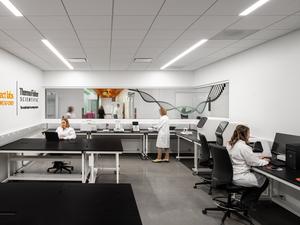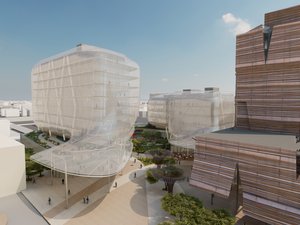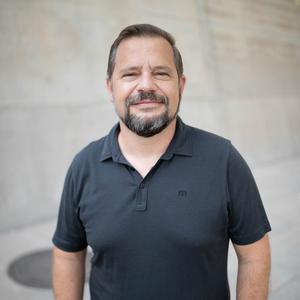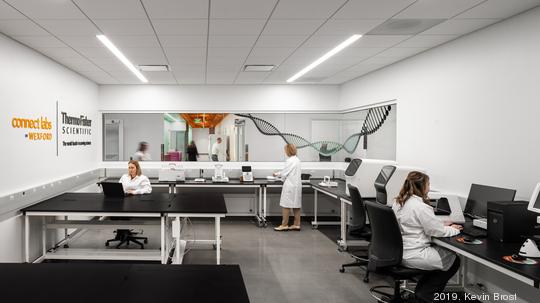
A Valley-based tech startup was recently awarded a NASA grant to advance its semiconductor technology and has found a new home in the downtown Phoenix Bioscience Core.
Crystal Sonic is among 12 companies nationwide and two in Arizona that received an $850,000 grant as part of NASA’s SBIR Ignite program to fund early-stage, high-risk technology concepts for commercialization. Tempe-based Solestial Inc. also received a grant to build solar arrays for space infrastructure.
Crystal Sonic develops materials processing technology to reduce waste and costs in the semiconductor industry.
The company will use the NASA grant to further develop its Sonic Lift-Off technology for space photovoltaics over the next 15 months, said Arno Merkle, co-founder and CEO of Crystal Sonic.
“We're basically working to upscale our technique to larger diameter wafers,” Merkle told AZ Inno. “The plan currently is for this to run for 15 months, and it will allow us to also build an updated next-generation prototype tool to refine some of the process engineering that we need to improve the technique, and we’ll work with different manufacturers of solar cells to really refine the technique to their requirements.”
For more in-depth reporting on the Valley's innovation scene, sign up for one of Phoenix Business Journal's free daily newsletters.
Using sound to slice
The company's Sonic Lift-Off acoustic bass technique uses sound waves to cut and lift off thin crystal wafers used in semiconductor device fabrication, leaving behind bulk substrate for reuse.
Crystal Sonic’s patented technology originates from Arizona State University’s Defect Engineering for Energy Conversion Technologies lab, which is led by professor Mariana Bertoni, who had an idea to use sound to cut materials for solar photovoltaics and reduce waste.
Bertoni and a group of doctoral students, including Pablo Guimerá Coll — a co-founder of Crystal Sonic — turned the idea into a demonstration in the lab. The co-founders worked with ASU and Skysong Innovations to further develop the technology and obtain a patent for it. In 2018, Crystal Sonic was born.
The company, which has five employees, is in the process of growing its team and partnering with companies to prove its concept for various devices, Merkle said.
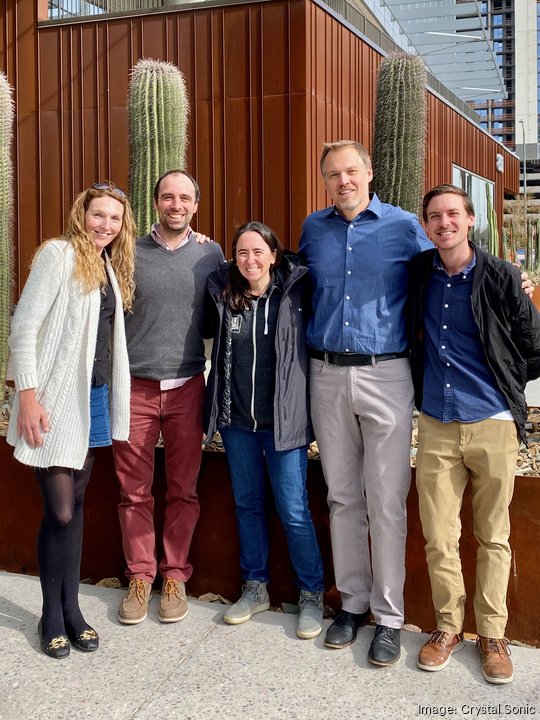
Crystal Sonic’s target customers include semiconductor material suppliers, device manufacturers and equipment manufacturers.
“We've had interest from all three areas in the industry, but the end use customer for the technology is the device manufacturer and so that's what we're exploring at the moment,” Merkle said.
Crystal Sonic is focused on what it describes as an “emerging class” of chips based on wide bandgap semiconductors, which are used in electric vehicles, solar panel inverters, sensors and radio frequency communication devices.
“We really see ourselves as an enabling technology for the semiconductor industry for advanced manufacturing of next generation chips and we want partner with the right companies in that space and increase our footprint,” Merkle said.
Crystal Sonic moves into Connect Labs
Crystal Sonic is among three companies that recently moved into Connect Labs by Wexford, on the fifth floor of the 850 PBC building, part of the Phoenix Bioscience Core, a 30-acre life sciences innovation district in downtown Phoenix.
Crystal Sonic, along with ExoDigm Biosciences and Medi Life Healthcare Solutions, leased a combined total of 2,600 square feet in the lab.
The 34,500-square-foot Connect Labs space contains wet labs, offices and convening areas designed to spur collaboration among companies, entrepreneurs and university researchers.
Connect Labs is now home to a total of 12 companies. At full capacity, it will be able to house between 20 to 25 startups.
“The continued interest in Connect Labs by Wexford from a wide range of life science and advanced technology companies demonstrates the need for high-quality flexible lab and office space that brings together entrepreneurs and scientists into a cohesive and collaborative community,” Kyle Jardine, vice president for Wexford Science and Technology, said in a statement. “We’re excited to welcome ExoDigm, Crystal Sonic, and Medi Life to the Connect Labs and PBC ecosystem.”
